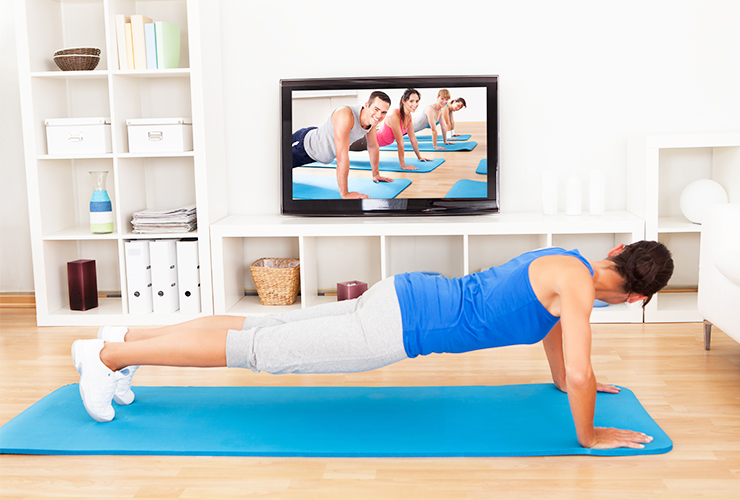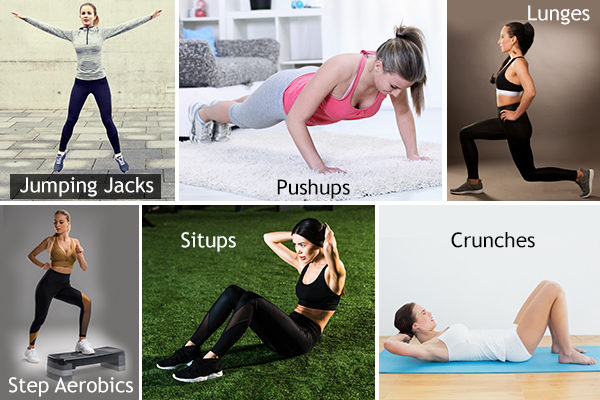In this article:
The COVID-19 virus has impacted the world in unimaginable ways. This unprecedented crisis has created fear and anxiety in many people. The big challenge is to stay healthy and to stay fit during the stay-at-home orders, which are now implemented in all 50 states of the United States.

With so much uncertainty, there are many things people do not have control over. One thing people probably agree on is to stay healthy and practice social distancing, hand washing, and using face masks.
Nurturing the mental and physical health is also a must. Eating well and staying active are parts of the formula.
What Are the Benefits of Exercise?
Exercise has many benefits, which include stress reduction, (1) improving cardiorespiratory fitness, (2) improving muscle tone, strengthening the immune system response, (3) and weight control. (4)
Staying fit without gym access requires a bit more creativity, but there is absolutely no reason you cannot get good workouts at home. The next section outlines some suggestions for the whole family that will reduce stress and boredom and also will keep everyone happy and safe.
You can safely exercise outside. The key is to keep appropriate distances and to wear face masks. The recommendation is a 6-feet buffer zone. However, it is best to double that distance to be on the safe side.
How to Exercise Safely at Home?

The easiest and most convenient place to exercise is in your home. Exercising daily is good for your mental state and your physical health. (1)(4) It also gives you something to look forward to during these self-quarantine days.
A small space works well and what you can do in a small space is simply amazing. Here are some exercises that your family can do:
- Jumping jacks: One exercise that is effective in a small space is jumping jacks. This old aerobic exercise can get your heart rate up quickly and can build stamina. This fun exercise is also good for children.
- Pushups: Pushups help work out your shoulders, chest, and triceps and can be done nearly anywhere. They are an effective strength-building exercise for adults, but they may not be suitable for young children due to a lack of upper-body strength.
- Lunges: Lunges are a great exercise for leg strengthening and can be done in confined places.
- Squats: Squats are another effective exercise for the legs and glutes. Children can do this exercise without a problem as well.
- Step aerobics: Step aerobics can be done in the comfort of your living room, and you can even watch TV at the same time. All you need is a flight of stairs or a step platform. Children will find this exercise fun as well. This exercise works your legs, hip flexors, and buttocks.
- Abdomen-strengthening exercises: You can work out your abdomen with situps, crunches, leg lifts, and trunk rotations. Children will also benefit from these exercises.
- Outdoor activities: If you have the time, go for a walk, bicycle ride, or a jog. These exercises are especially recommended as being outside is good for your mental health. Children will certainly enjoy these outside activities as they can benefit from fresh air and sunshine. Needless to say, you must adhere to the proper safety measures when venturing out to avoid getting or spreading the infection.
How Important Are Mental Exercises?
Your mental health is also under assault and it is important to fit some quiet time in your schedule for relaxation, meditation, and visualization.
Limit your time watching the news as sensationalized news can induce stress. Reading the news once a day or listening to news updates on your radio may be better options.
If you feel stressed and you need a quick remedy, deep breathing and positive thoughts or words work well. For example, you can go down memory lane and reminisce about your favorite time of the year or imagine the joy you experienced on your last vacation or other events.
Should a Sick Person Be Exercising?
If you or a family member has COVID-19, a cold, or the flu, the recommendations are to rest and treat your symptoms. However, if you feel well enough, walk or sit up as doing so may help avoid complications.
If you have shortness of breath or fever, do not exercise. Difficulty breathing is an emergency situation and should be treated that way. Call 911 immediately. Low-intensity exercises, such as yoga and active range-of-motion exercises, are also beneficial, even if you are not feeling 100%.
Final Word
There is a tendency for many people to eat when they are stressed. This behavior is common and understandable because food is very comforting. Food can produce endorphins that can make you feel better.
My suggestion is for you to be mindful of your emotions and to think positively and to find healthy outlets for your emotions, such as reading, writing down your thoughts, gardening, taking a hike, or checking in on family members.
Remember that we will get through this difficult period, but we all must do our part with social distancing, hand washing, and wearing masks to keep ourselves and others safe.
- Was this article helpful?
- YES, THANKS!NOT REALLY


